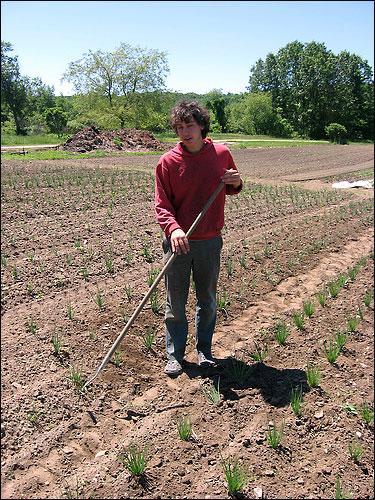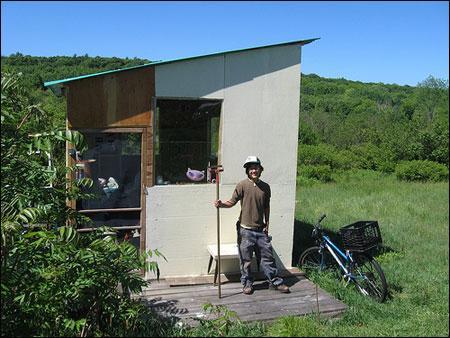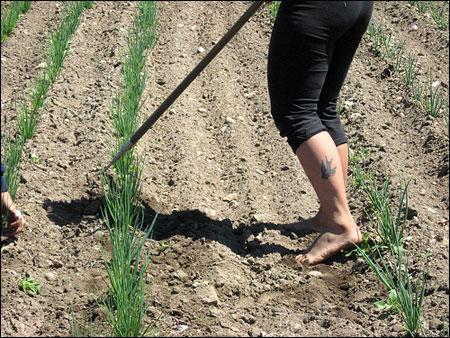Advertisement
Community Supported Farms Sprout Up Across Massachusetts
Resume
Driving across the fields of their Stone Soup Farm, in view of the geologically ancient Holyoke Range, some of the youngest farmers in New England are preparing to go to market.
Jarrett Man, Stone Soup's owner and manager, and Annie Sullivan-Chin are surveying their crop. “Back here, we’ve got some bunches of swiss chard, some bunches of cilantro, some heads of lettuce,” Annie says.
Annie graduated from Mount Holyoke College a couple years ago. Jarrett graduated from Hampshire College, worked on organic farms in India, then, after a few years at a nearby farm, decided to start his own.
“We put in strawberries here, which are now ready or just about,” Jarrett points out, continuing to drive across the farm. “I bet we could find a couple of red ones,” he laughs.
Listening to sweet talk and watching 20-year-olds hoeing sweet onions in their bare feet makes one think of the back-to-the-land movement of the early ‘70s. But the reality is that, more than a hippie adventure, Stone Soup Farm is making it as a community and as a business.
Jarrett, who’s 26, is paying the salaries of five friends who also get to live on the farm and eat free. Though he’s had to invest in a couple of tractors, a couple of vans and a walk-in cooler, he says he’s confident the farm will be profitable within a year or two.
And here’s the key to success: Jarrett sold the farm's harvest directly to consumers before the growing season ever began, through a program called community supported agriculture, or CSA. Jarrett says the farm has almost 200 CSA members as its customers.

In return for paying an average of $500 for one full share, customers get anywhere from six to 14 pounds of freshly-picked vegetables and ripe fruits every week for the whole growing season. Jarrett gets $70,000, mostly up front.
“CSA makes making money a lot easier, because we know how much money we can make, and we know that we’re going to get it,” he says. “I don’t think that we could have started out on this scale, this rapidly, if it hadn’t been for the CSA model being in place and people being ready to buy.”
An abandoned dairy farm next door to Stone Soup speaks of a long decline in local agriculture, which is now reversing itself in a surging demand for locally grown food. In the last five years, the number of farmers markets in Massachusetts has doubled, and the number of CSAs seems to jump every year.
Each week, as Stone Soup delivers boxes of fresh vegetable and fruits to a drop-off site at the Democracy Center in Cambridge, they find enthusiastic customers.
Sarah Parker is typical. “It’s super exciting,” she says. “I tell people at work, I’m like, I get to go pick up my democratic vegetables! It’s in my calendar. Like I can’t wait, every Tuesday, to pick up the vegetables. I eat better when I eat this stuff.”
It’s clear these weekly encounters between farmers and CSA shareholders foster community and a commitment to protecting family farms and farmland all the way back to Pioneer Valley.

Dave Jackson of Whately, who is twice Jarrett Man’s age, has weathered all manner of change. “You know how to make a million dollars farming, don’t you?” he asks, deadpan. “You start with $2 million.”
Jackson started a two-acre organic farm in the early ‘80s. It grew with the organic supermarket Bread & Circus, then grew still more as farmers markets grew. He now has 75 acres, a year-round operation, due in part to the rise of CSAs.
“Local is like, focus on the people around you, keep the money close to home,” Jackson says. “And the CSA thing and the organic thing, as a confluence, have really done wonders for our farm operation.”
He knows that, even in summertime, 75 percent of all produce purchased in Massachusetts comes from out of state. Prices are largely controlled by California agribusiness. But Dave Jackson has found a way to profitability, and Jarrett Man is finding it too: locally-grown, directly-sold, healthy food.
This program aired on June 12, 2009.
